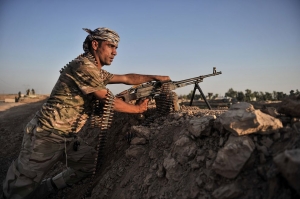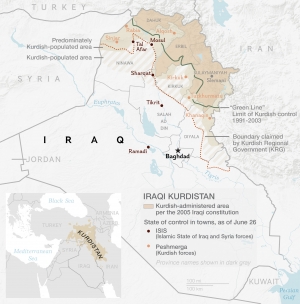mis à jour le Mercredi 16 juillet 2014 à 15h02

Kurdish forces
Kurdish forces stand guard against ISIS fighters in the oil-rich city of Kirkuk on June 17, 2014.

IRAQI KURDISTAN
JUAN VALDÉS AND LAUREN E. JAMES, NG STAFF. SOURCE: INSTITUTE FOR THE STUDY OF WAR; INTERNATIONAL CRISIS GROUP
National Geographic | By Avi Asher-Schapiro
Their centuries-old dream of statehood is coming closer amid the chaos of war.
As Sunni fighters led by the jihadist group ISIS have pressed forward, capturing the Iraqi cities of Mosul, Tikrit, and Ramadi and encircling Baghdad, Iraq's Kurds have taken advantage of the chaos by expanding their territory and pushing for greater autonomy.
During the past month Sunni militants have spilled out of Syria, dissolved the Iraq-Syria border, and established an Islamic caliphate that straddles the two countries. The Iraqi army fled in the face of the Sunni advance, but Kurdish militia fighters repelled ISIS (Islamic State of Iraq and Syria) at their borders. On June 12, Kurdish militias advanced, seizing oil-rich Kirkuk, a city at the edge of Kurdistan that Kurds claim as their own, but which the Baghdad-based government considers beyond Kurdish borders.
With the Iraqi central government in shambles, Kurdish leaders are now calling on Iraq Prime Minister Nouri al-Maliki to step down.
Sitting atop an ocean of newly conquered oil fields and emboldened by the breakdown of the Iraqi state, Kurdish President Masoud Barzani declared that the Kurds would not cede their newly conquered territory. "We cannot remain hostages for the unknown … The time is here for the Kurdistan people to determine their future," he said.
But the recent turmoil in Iraq does not alone explain the surge toward greater Kurdish independence. Since the founding of modern Iraq nearly a century ago, Kurds in the north—nestled along the Turkish, Syrian, and Iranian borders—have chafed against the central government in Baghdad. (Related: "Iraq Crisis: 'Ancient Hatreds Turning Into Modern Realities.'")
Distinct Traditions
The seeds of the conflict can be found in the unique predicament of the region's estimated 30 million to 35 million Kurds, the world's largest ethno-linguistic group without a state of their own. Kurds are a traditionally nomadic people from the crossroads of Mesopotamia, Anatolia, and Persia, united by a common mother tongue—a group of Iranian languages known as Kurdish—and a shared history of life on the margins of the greater regional empires in western Asia.
Though most Kurds are Sunni Muslims, they have no affinity with the ISIS-led Sunni insurgency, and there are Christian, Jewish, and Shiite Kurdish minorities. As a multi-religious community, they are united by a historical connection to Kurdistan. "The Kurds are one of the oldest ethnic groups in the entire region—and they consider Kurdistan to be their homeland," says Christian Sinclair, president of the Kurdish Studies Association and assistant director of the Center for Middle Eastern Studies at the University of Arizona.
For centuries the rugged terrain of Kurdistan served as a buffer between the Ottoman Empire to the west and its Persian rivals—first the Safavids and later the Qajars—to the east. This particular geographic predicament helps to explain how Kurds retained their own distinct identity. Until the 19th century Kurds were organized into a mosaic of independent chiefdoms in the contested frontier zone. Caught in the middle of a centuries-long imperial rivalry, they maintained a certain degree of self-rule and often were deployed as proxies in wars between the Ottomans and the Persians.
The kernel of modern Kurdish self-determination can be found in these early chiefdoms, says Christine Allison, chair of Kurdish studies at Exeter University in the U.K. "We can detect a sort of early 'Kurdism,' a brand of Kurdish nationalism, in these independent Kurdish zones," she says. "They developed and nurtured a language, cultural, and literary tradition distinct from their neighbors," she adds.
Scattered Between Nations
Kurdish self-determination did not take priority in the flurry of mapmaking and border drawing that followed World War I, when European powers carved up the Ottoman Empire into spheres of influence.
Initially, the Kurdish Ottoman diplomat Mohammed Serif Pasha managed to insert language into the Treaty of Sèvres—the negotiated surrender of the Ottomans to the allied powers—that would allow for an autonomous Kurdistan in the new regional order.
But the envisioned state never materialized. Kemal Atatürk's Turkish nationalist movement rejected the treaty, which would have conceded chunks of eastern Turkey to the Kurdish state. Atatürk renegotiated with the Allies, and the new peace—known as the Treaty of Lausanne—divided the Kurds between Turkey, Syria, Iraq, Iran, and Armenia.
Scattered throughout five newly birthed nations, the Kurds still shared a cultural affinity, says Djene Bajalan, an expert on Kurdish history who lectures at the American University of Iraq. "But as the region got divided into ethnic nation-states, the Kurdish community was excluded," he adds. For the next 90 years, Kurdish minorities largely retained a connection to their unique language and culture, yet they remained strapped to the political fate of their host nations, in limbo between autonomy and dependence.
Consequently, the nearly four million Kurds of northern Iraq never truly became Iraqis, and their political leaders did not accept the authority of Baghdad. Unlike Kurds in Syria and Iran, who live dispersed throughout their respective countries, Iraqi Kurds (like Turkish Kurds) are heavily concentrated in the north, where they enjoy demographic majorities in three provinces: Erbil, Sulaymaniyah, and Dahuk.
Gap Between Baghdad and Kurdistan
Beginning in the 1950s the Iraqi monarchy, and later the ruling Baath regime, held intermittent negotiations with Kurdish tribal and political leaders, allowing for periods of regional autonomy. But at the core, the relationship was antagonistic.
In the 1970s, Saddam Hussein launched a campaign of "Arabization," encouraging Arabs to relocate to the Kurdish north. Then, in the late 1980s, Hussein had Kurds massacred in a brutal attempt at ethnic cleansing.
At the same time, Iraqi Kurds steadily built their own cultural and political center of gravity. Unlike in neighboring Turkey, where the Kurdish language was outlawed, Kurds in Iraq freely spoke Kurdish. In 1991, the presence of international troops in Kurdistan following the first Gulf War, along with a U.S.-enforced no-fly zone, allowed the Kurds to hold elections and form the Kurdish Regional Government (KRG).
The gap between Baghdad and Kurdistan widened after the U.S. invasion in 2003. The new Iraqi constitution paved the way for greater federalism and, perhaps more important, granted Kurds the right to be educated in their own language. "Over the past decade, the geographic split has been amplified by a growing linguistic split," explains Sinclair. "These days, Arabic is taught as a foreign language in Iraqi Kurdistan, so Kurds have an even weaker connection to greater Iraq because people can't speak to each other."
Even before ISIS's advance this month, Kurdish leaders and the al-Maliki's government had clashed over shared oil revenues, the exact border of Kurdistan, and how to finance the independent Kurdish militias. The collapse of the Iraqi state has undoubtedly strengthened the Kurds' hand in their push for independence.
A New Reality
But there are still major hurdles, many of them geographic and demographic, ahead. Iraqi Kurdistan is landlocked and reliant on its neighbors for access to the sea. An independent Kurdistan would have to transport its oil by land with the cooperation of its neighbors.
And while ISIS's advance has allowed the Kurds to expand their territory, Kurdistan now shares a 600-mile border with the Sunni militants—a dangerous and permeable frontier that threatens Kurdish stability. As a result, Iraqi Kurdistan has also become a safe haven for Kurds fleeing ISIS and the Syrian civil war.
The hundreds of thousands of refugees are putting a strain on Kurdish resources, and gas shortages are now commonplace. If Iraq breaks into pieces, the security and stability of Kurdistan are not assured, and so far Kurdish leaders have refrained from declaring outright independence.
While the new reality brings challenges, the disintegration of the Iraqi state is without a doubt a game changer for the Kurds. "The idea of a Kurdish nation has now become an undeniable reality for millions," Exeter University's Allison says. "In the future, Kurdistan will be very difficult, if not impossible, to eliminate from any political picture."


